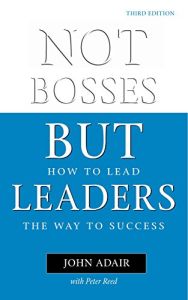
Not Bosses But Leaders
How to Lead the Way to Success
Recommendation
This short volume collects some of the most time-honored principles of leadership and compiles them in a series of short, easy-to-read chapters. Author John Adair draws on some unlikely sources for his material, finding inspiration even in Cromwell, the fanatical Puritan revolutionary; in the experience of the German army during World War II and in other characters and events not usually cited in management tomes. Adair’s classic on leadership, now reissued, is a very useful handbook that resembles inspirational reading more than an expository how-to. On the downside, the book needs tightening. In particular, the author’s lists of "key points" tend to be vague, passive and general. Nonetheless, getAbstract.com believes that gem seekers will find useful nuggets of leadership counsel here and that business readers will enjoy the intriguing array of quotable stories and sources.
Summary
About the Author
John Adair is founder of Europe’s first Centre for Leadership Studies, which is based at the University of Exeter. He writes, teaches and consults worldwide. His books include How to Find Your Vocation, The Leadership of Jesus and Effective Strategic Leadership.








Comment on this summary